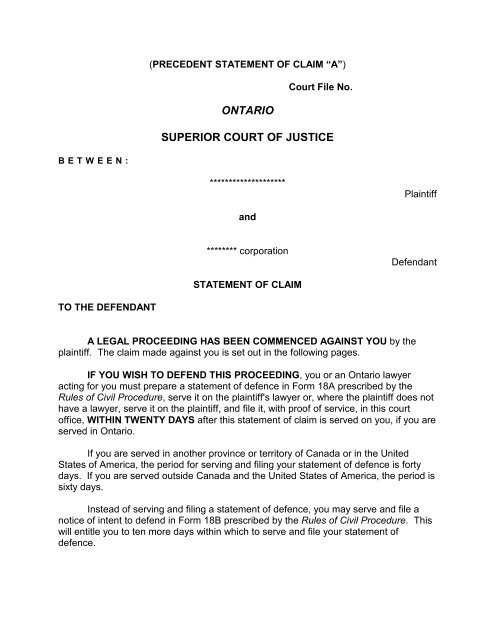What is it?
If you have received (been “served” with) a Statement of Claim, you should contact a lawyer immediately. A Statement of Claim is a document, known as an “originating process” that commences a lawsuit in Ontario’s Superior Court of Justice. It is not used in Small Claims Court (the equivalent document in Small Claims Court is called a Plaintiff’s Claim).
If you have been named as a Defendant, it means you have been sued. You can check if you’ve been named as a Defendant by reading the front page of the Statement of Claim.
The front page of the Statement of Claim will look something like this…

What do I do?
In Ontario, Defendants have 20 days to give a Statement of Defence to the Plaintiff or the Plaintiff’s lawyer, and file a copy of the Statement of Defence in Court. Giving a copy of a document to the other side is called “service”, and giving a copy to the Court is called “filing”. You can get an extra 10 days by serving and filing a Notice of Intent to Defend. These are formal Court documents, and they must be prepared using the appropriate forms.
Do not attempt to prepare these documents yourself, as you will most likely prepare them incorrectly, which could result in financial consequences or losing your case.
If you fail to serve and file a Statement of Defence within the deadline, the Plaintiff can “note you in default” of the lawsuit, and you will lose your right to defend yourself. You will then be ordered to pay money to the Plaintiff, which can be enforced through the sheriff’s office. The sheriff’s office can enforce Court judgments by seizing your assets, such as your home, and freezing your bank accounts.
However, your lawyer can help you file a strong defense and gather the relevant evidence. The Plaintiff must prove his or her case against you, and there are many rules that must be followed. If you and your lawyer successfully defend the case against you, the Plaintiff can be ordered to pay for some or possibly all of your legal costs.
The lawyers at KPA have experience representing both Plaintiffs and Defendants in Superior Court. Contact us for consultation to discuss your options.



